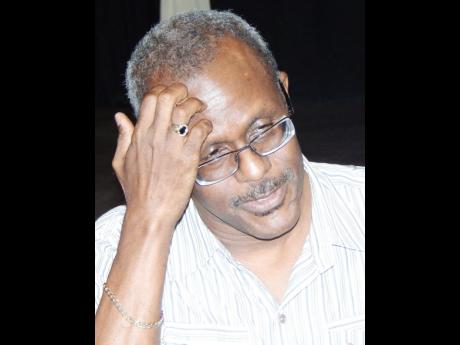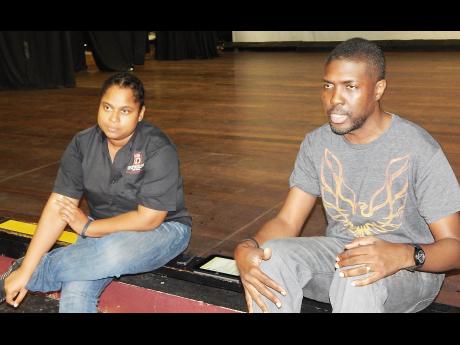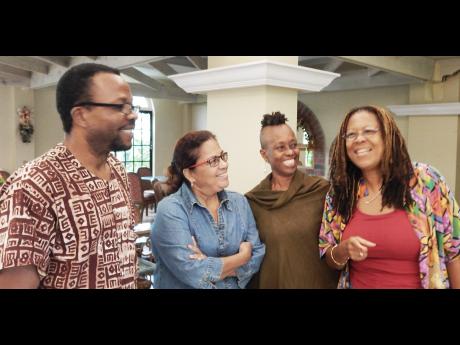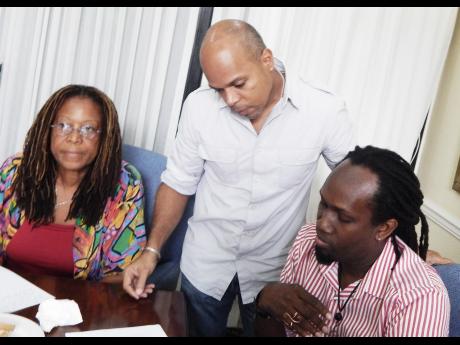Training to assess
Actor Boy judges instructed on complex process
"Adjudication is tricky," said Dr Brian Heap. The caution came during his mid-December presentation at The Knutsford Court Hotel, New Kingston, to a new panel of Actor Boy Award judges. We (for I am one of them) have taken up the judging duties technically relinquished on December 31 by the previous Actor Boy panel after three years of evaluating about 20 new plays a year.
That's right, 20. And at times, in the past decade or so, the number has neared 30. And that's only counting commercial productions, not the many short plays staged in various festivals and competitions like the Secondary Schools' Drama Festival, the University of the West Indies' (UWI) Tallawah and the Jamaica Cultural Development Commission's (JCDC) drama competitions.
Jamaica is not prolific in music production only. We certainly lead the rest of the Caribbean in the staging of plays and musicals. Four opened in the last fortnight, and two more are scheduled to be opened this month.
Listening to Dr Heap, along with me - a 'veteran' Actor Boy judge - were brand-new adjudicators Joan Belfon, Cecile Clayton, Janilee Abrikian, and and Dr Mawuena Logan. Also there were judging coordinator Suzanne Beadle and producers of the Actor Boy Awards ceremony Michael Daley and Maurice Bryan.
All the new judges, except perhaps one, should be well known to the theatre community, as they've been active in or on the periphery of theatre in Jamaica for years. The exception is Dr Logan, who is from Africa. He is a senior lecturer in the Department of Literatures in English at the UWI, Mona, where his courses include literary theory, postcolonial literatures of Africa and the African diaspora, and African-American literature. Though not himself a theatre practitioner, Dr Logan's teaching of dramatic literature has, he said, given him a deep appreciation of the stage.
Daley and Bryan had arranged training sessions for the new judges. Dr Heap was the first of seven specialists in various aspects of theatre who, in two sessions at different venues, informed or reminded the new judges just how complex adjudication can be.
Dr Heap dealt with judging acting and character development. Also speaking at that first session were Michael Holgate (on judging choreography, music and the script), Eugene Williams (directing, costuming, and overall production) and Tanya Batson-Savage, chair of the outgoing judging panel, who spoke on the use of the judges' and producers' forms.
The trainers at the second session, held a few days later at the Philip Sherlock Centre for the Creative Arts (PSCCA), UWI, Mona, were lighting designers John DaCosta and Nadia Roxburgh, along with set designer Michael Lorde. They spoke on their respective specialisations.
Backing up his assertion about adjudication being "tricky", Dr Heap pointed out that it's not always clear who the lead actor or actress in a play is. "It's possible for the producer to think one performer is the lead, while the judges think it's someone else," he said.
"And can you legitimately compare the acting in a classical play with acting in a roots play?" he asked. "It would be like comparing apples and oranges. The best actor in a roots play will act in a different style from a best actor in another type of play."
Daley's response was to read out the headings on the judges' form for marks in the Best Actor in a Lead Role category. The headings are Characterisation, Range & Depth of Emotion/Expression, Voice and Diction, and Movement. Even so, as Dr Heap pointed out, "assessing an acting performance can be very subjective."
Speaking next, Holgate stressed the importance of a play having a good storyline - meaning one with a strong emotional or spiritual element, a clear premise, cohesion, conflict, logical development and characters who grow. In musicals, he said, the music and dance should "complement the play."
Touching on the subjectivity of judging mentioned by Dr Heap, Holgate said the aesthetics of an Afro-Caribbean production are different from those of an European one. That led him into musing about the possibility of the theatre appreciation training being given to the Actor Boy judges also being given to theatregoers in general.
He was implying it would lead to a raising of our theatrical standards.
And so say all of us.
CENTRELINE: More than illumination
"The director's vision and the script should be reflected in the lighting design," Roxburgh told us. Unfortunately, she said, most plays are not lit adequately, with directors going for "straight illumination" just so the audience can see. That could leave the production bereft of things like atmosphere and dimension, which, DaCosta said, proper lighting should give.
Is this because our theatres don't have modern lighting equipment, I asked Roxburgh. Forget "modern" she replied. "Most theatres don't have enough lights, period. Even Little Theatre and the PSCCA, which have the most sophisticated equipment, don't have enough lights," Roxburgh said.
Though he admitted that poor lighting can make a play's set look horrible, Lorde said it should look good on its own and not have to depend on flattering lighting. Under the general heading set design, he spoke about originality and creativity, authenticity, visual impact, finish and construction and flexibility.
Illustrating his talk with photographs and sketches from the numerous plays for which he has designed sets over the years, Lorde showed the importance of colours, how a mansion could be suggested on a small stage and how sections of one set could be reused in a subsequent scene.
He spoke of his use of angles to make a set look interesting and not flat, the necessity of co-ordination and co-operation among the set, props and lighting designers, and generally about how "a set should interpret the script."
The Actor Boy Awards ceremony for 2014 productions will be held on March 30. Those shows have been judged by the Batson-Savage led panel, which included Keith Noel, Jeanette Campbell and Franklyn 'Chappie' St Juste.





